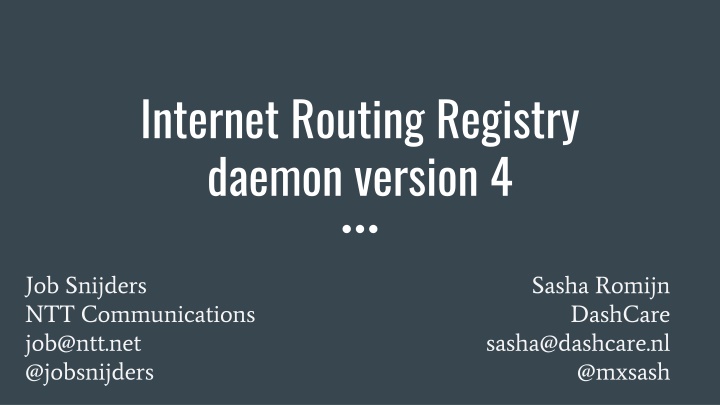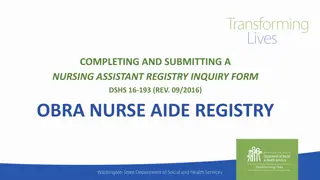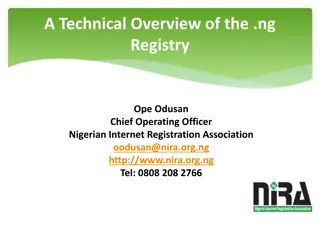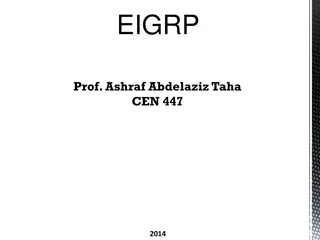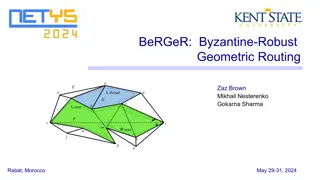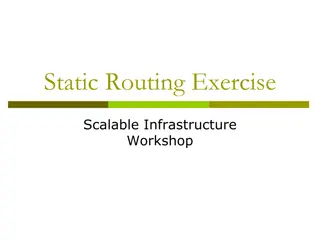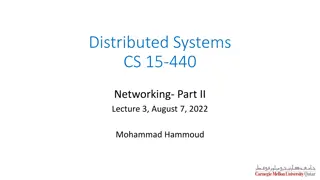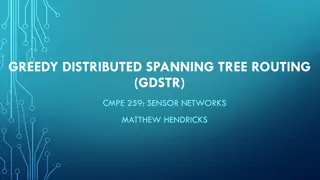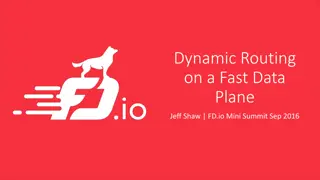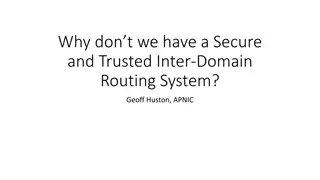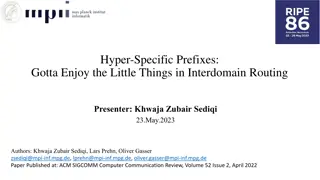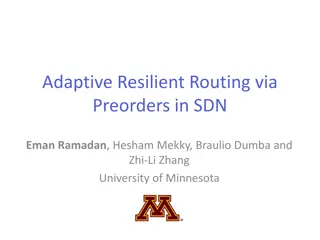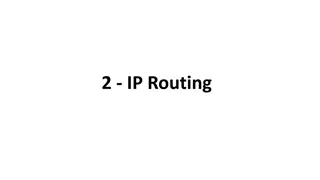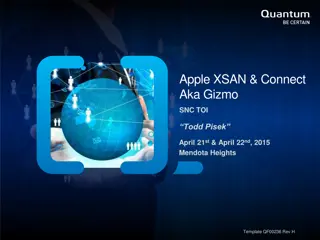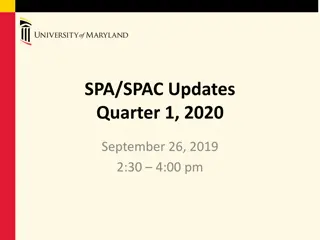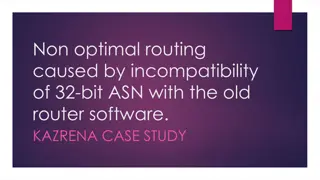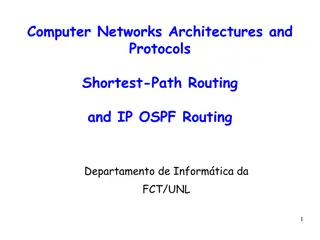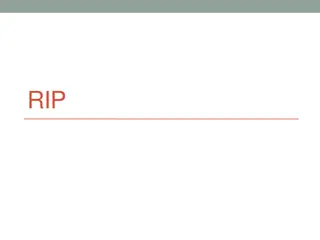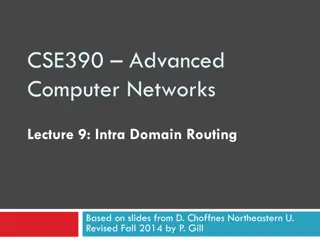Enhancing Internet Routing Registry Daemon
Internet Routing Registry daemon version 4, developed by Snijders at NTT Communications, plays a critical role in prefix-filter operations. IRRd v3, an organically grown 20-year-old code base, faces reliability challenges and lacks innovation opportunities. The new IRRd v4 aims to introduce modern architecture, extension options, and better documentation, with a planned rewrite in Python 3.6 and PostgreSQL. This evolution is essential for NTT's daily operations and routing security roadmap.
Download Presentation

Please find below an Image/Link to download the presentation.
The content on the website is provided AS IS for your information and personal use only. It may not be sold, licensed, or shared on other websites without obtaining consent from the author.If you encounter any issues during the download, it is possible that the publisher has removed the file from their server.
You are allowed to download the files provided on this website for personal or commercial use, subject to the condition that they are used lawfully. All files are the property of their respective owners.
The content on the website is provided AS IS for your information and personal use only. It may not be sold, licensed, or shared on other websites without obtaining consent from the author.
E N D
Presentation Transcript
Internet Routing Registry daemon version 4 Job Snijders NTT Communications job@ntt.net @jobsnijders Sasha Romijn DashCare sasha@dashcare.nl @mxsash
IRRd v3 is an organically grown, 20 year old code base, mostly in C, perl, flat text file backend Reliability issues with irrd2/irrd3 (fix is to restart the daemon...) Absolutely critical to NTT s daily operations - All All NTT Communications prefix-filters come from irrd instances! Why IRRd v4 @jobsnijders / job@ntt.net sasha@dashcare.nl / @mxsash
job@vurt irrd$ cloc . 189 text files. 185 unique files. 28 files ignored. github.com/AlDanial/cloc v 1.74 T=2.25 s (71.9 files/s, 36938.2 lines/s) ------------------------------------------------------------------------------- Language files blank comment code ------------------------------------------------------------------------------- C 92 6645 9205 33967 Perl 10 812 877 12451 Bourne Shell 4 993 1308 9687 C/C++ Header 35 722 549 3608 yacc 1 326 111 1453 make 20 168 63 313 ------------------------------------------------------------------------------- SUM: 162 9666 12113 61479 @jobsnijders / job@ntt.net sasha@dashcare.nl / @mxsash
No possibility for innovation, extensions IRRd v3 is dumb middleware, literal transposition between input and output - need to move to smart middleware For routing security road map see slides 11-18: http://www.lacnic.net/innovaport al/file/3135/1/lacnic30_snijders_r outing_security_roadmap.pdf Why IRRd v4 Looking forward @jobsnijders / job@ntt.net sasha@dashcare.nl / @mxsash
Single modern architecture with extension options Codebase that is well documented, consistent, maintainable Extensive test suite QA checks comparing to current rr.ntt.net Goals for IRRd v4 @jobsnijders / job@ntt.net sasha@dashcare.nl / @mxsash
BSD 2-Clause licensed Complete rewrite Python 3.6 & PostgreSQL Planned for future expansion Using third party projects over inventing things ourselves Strict requirements on data validation and consistency 100% coverage unit tests Extensive documentation Development principles @jobsnijders / job@ntt.net sasha@dashcare.nl / @mxsash
Basic IRRd v4 architecture NRTM / full mirror import WHOIS query parser DB Query resolver Database handler psql RPSL parser Email update parser Auth/reference validator Journal keeping @jobsnijders / job@ntt.net sasha@dashcare.nl / @mxsash
class RPSLAsSet(RPSLObject): fields = OrderedDict([ ("as-set", RPSLSetNameField( primary_key=True, lookup_key=True, prefix="AS")), ("members", RPSLReferenceListField( lookup_key=True, optional=True, multiple=True, referring=["aut-num", "as-set"])), ("tech-c", RPSLReferenceField( lookup_key=True, optional=True, multiple=True, referring=["role", "person"])), ("mnt-by", RPSLReferenceListField(lookup_key=True, multiple=True, referring=["mntner"])), ..., ..., ...]) @jobsnijders / job@ntt.net sasha@dashcare.nl / @mxsash
Metadata extraction (as-set) rpsl_pk = AS-RIPENCC source = RIPE object_class = as-set parsed_data = { "as-set": "AS-RIPENCC", "mnt-by": ["RIPE-NCC-MNT"], "source": "RIPE", "tech-c": "DUMY-RIPE", "admin-c": "DUMY-RIPE", "members": ["AS3333", "AS2121", "AS12654"]} @jobsnijders / job@ntt.net sasha@dashcare.nl / @mxsash
Metadata extraction (route) parsed_data = {"route": "193.0.0.0/21", "mnt-by": ["RIPE-NCC-MNT"], "origin": "AS3333", "source": "RIPE"} ip_version = 4 ip_first = 193.0.0.0 ip_last = 193.0.7.255 ip_size = 2048 asn_first = 3333 asn_last = 3333 @jobsnijders / job@ntt.net sasha@dashcare.nl / @mxsash
Almost everyone deviates from RFCs in slightly different ways RPSL has a few strange features, and doesn t always fit common storage methods Invalid objects occur in many databases (improved) NRTM is barely documented and inconsistently implemented Interdependent email updates Challenges (all solved) @jobsnijders / job@ntt.net sasha@dashcare.nl / @mxsash
RPSL has many exciting features inetnum: 192.0.2.0 - 192.0.2.255 source: DEMO inetnum: 192.0.2.0 # documentation prefix +- 192.0.2.255 # end source: DEMO @jobsnijders / job@ntt.net sasha@dashcare.nl / @mxsash
and all kinds of invalid objects aut-num: AS65536 notify: EXAMPLE-MNT notify: our address is info@example.com source: DEMO @jobsnijders / job@ntt.net sasha@dashcare.nl / @mxsash
Thats not an AS number route: 192.0.2.0/24 origin: 64496 source: DEMO @jobsnijders / job@ntt.net sasha@dashcare.nl / @mxsash
ASDOT never left as-set: AS-EXAMPLE members: AS64496, AS64497 members: AS1.0, AS1.1 source: DEMO @jobsnijders / job@ntt.net sasha@dashcare.nl / @mxsash
Note that only the ASCII character set can be used. mntner: upd-to: upd-to: auth: mnt-by: source: ~~~~~~~~~~~~~~~~~~~~~~~~~~~~~~~~~~~~~~~ ERROR: Line 3: encountered empty line in the middle of object: [] EXAMPLE-MNT ***@example.com ***@example.com MD5PW # Filtered EXAMPLE-MNT DEMO @jobsnijders / job@ntt.net sasha@dashcare.nl / @mxsash
Incomplete objects in NRTM (not only RADB) %START Version: 3 radb 3917323-3917323 DEL 3917323 route: 116.86.232.0/21 descr: StarHub Ltd - NGNBN Network origin: AS55430 %END RADB @jobsnijders / job@ntt.net sasha@dashcare.nl / @mxsash
2.6 million RPSL objects One NRTM update per 40s Average object 427 bytes Largest object is 3.4MB 1.6 GB PostgreSQL data, 1.4 GB PostgreSQL indexes Log of 330.000 rr.ntt.net queries to run QA tests/comparisons Statistics (based on deployment like rr.ntt.net) @jobsnijders / job@ntt.net sasha@dashcare.nl / @mxsash
Project ~75-80% complete ~4000 lines of code ~3000 lines of 214 tests (Mostly) completed: RPSL parsing and validation Object storage, indexing, search and journal keeping. IRRD/RIPE whois queries Mirroring other sources Logo coming soon Current IRRDv4 status Phase 1: replace existing IRRD with same features @jobsnijders / job@ntt.net sasha@dashcare.nl / @mxsash
Use of RPKI to negate conflicting IRR information (ala RIPE 2018-06 Policy Proposal) Business rules to clean up / reject objects Bogon prefixes & ASNs, special prefixes Integration with or validation against authoritative RIR databases Plans for phase 2 @jobsnijders / job@ntt.net sasha@dashcare.nl / @mxsash
Plans for phase 2 HTTPS API NRTMv4 Better query language, perhaps GraphQL? . (your input here) . @jobsnijders / job@ntt.net sasha@dashcare.nl / @mxsash
Thank you! https://github.com/irrdnet/irrd4 Job Snijders NTT Communications job@ntt.net @jobsnijders Sasha Romijn DashCare sasha@dashcare.nl @mxsash
